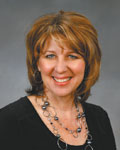March 5, 2015
Your Advocacy Connection
 Offering Comprehensive Long Term Care Solutions and Patient Advocacy
Offering Comprehensive Long Term Care Solutions and Patient Advocacy
By Julie Arndt
GolderCare Solutions
Care Needs…It Isn’t Zero to a Hundred
I’ve worked with Kathy Nitz, GolderCare’s Lead Benefits Advocate, for several years. She deals with the financial and public benefits aspects of our client’s matters. She is very fond of the saying, “people just don’t understand that it isn’t 0-100” when dealing with a health related problem that warrants some sort of care. Seriously, she says this unfailingly to me and clients on a weekly basis. So, what does this really mean? I thought I would take advantage of this article to lend some insight to what Kathy means by this.
It a nutshell, it means that just because you are having some issues that warrant outside help, it doesn’t mean that the next step is a nursing home. By securing the right help at the right time, it increases the likelihood that one can maintain their independence for all that much longer. We are so fortunate in the Quad Cities to be rich in resources for seniors and those needing care. All too often, I see folks wait until a situation is dire before they will even consider (a) telling someone about it; (b) exploring assistance options or (c) accepting assistance. What they don’t understand is by waiting too long to get help when they really need it, they may be inadvertently increasing the likelihood of need to move to the next level of care sooner than they otherwise would.
It can be daunting to actually admit to having a need, especially for Moms. We are the “caretakers” and it’s our job to make sure everyone else has what they need, right? It’s scary to find oneself in a new role. On a very small scale, I can personally relate to this on a couple different levels. I’m 50 years old and even with my cheaters or trifocals, my reading and sight up close is not good. I find myself forever asking our children to read things for me…you know, just the small print. The brand of milk we buy all of a sudden has an “overly” tightened screw top lid and what seems to be a “double adhesive tamper proof seal”. One day I got out the pliers to open it and am absolutely confident I looked like a mad woman in doing so (if anyone happened to see) especially as I was cutting through the seal top with a steak knife! As it happens, our son is still at home and is happy to oblige. But even now, it is very difficult for me to say, “Hey Sam, can you open this for me”? Of course, being a big 6’1- 200 pound 18 year old he is happy to help saying, “sure, Mom”. He makes it look easy. If it could always be this easy!
These are a couple tiny examples of even now, at age 50, I have needed to accommodate my physical limitations by asking for help. Doesn’t seem like a big deal, right? But let’s ramp this up a bit. Let’s say few years down the road I’m having some additional health issues. I live alone. I’m tired and do not feel well. It’s easier just to grab something out of the fridge than to fight with lids and hard to open frozen meals. I quit cleaning. I don’t even see those items of the floor that aren’t supposed to be there. And my pills. They all look alike and I’m not sure if I took them today. I’d like to say it will be as easy then as it is now to ask Sam for help. But will I? I’m not sure. I may be afraid that he will question whether I should be living at home alone. Will they think bad of me? Or worse yet, what if he and Abby, our daughter, would want to “put me in a home”?
Seriously folks, “need” sneaks up on a person. We often don’t recognize the signs, but hopefully, those around us will notice and open the door for us to easily access help. We need to be willing to accept help when it’s offered. Like Kathy says, it’s not 0-100. It’s not time for a nursing home just because you need a little help with meals, housework and medications. There are multiple services in our area that can be pursued to provide this type of intermittent help. We refer to it as “home care”.
Let’s take it one step farther. Let’s say I’m having all these issues plus my house and yard have become too much for me to handle. I may decide to consider moving perhaps to an “independent senior living community” where my meals and housework is provided. One step beyond that, perhaps I may consider an “assisted living” that also has someone to help me shower, get dressed and provide for my medication management.
Again, it’s not 0-100. There are multiple steps, considerations and options along the way that empower us to remain as independent as possible. Our goal at GolderCare is to keep folks at the least restrictive level of care [home, independent living, assisted living] for as long as possible. Not only do we need to look at the care need, but also how to pay for it and ensure our loved ones are in a position to help manage our care when we need it most.
Julie Arndt is a licensed social worker working in the field of geriatrics for over 25 years with expertise in medical case management and community-based services. You can reach Julie at Goldercare Solutions Unlimited, LLC (309) 764-2273.
Filed Under: Health & Wellness
Trackback URL: https://www.50pluslife.com/2015/03/05/your-advocacy-connection-12/trackback/


